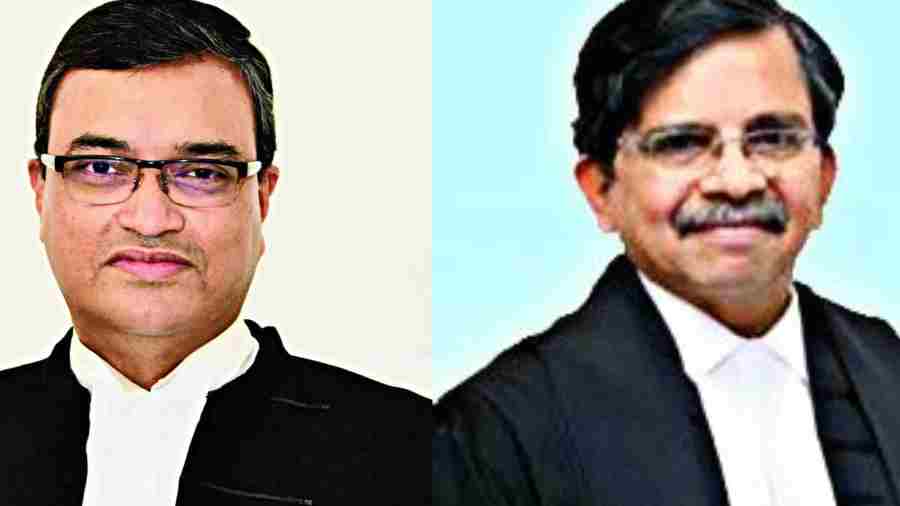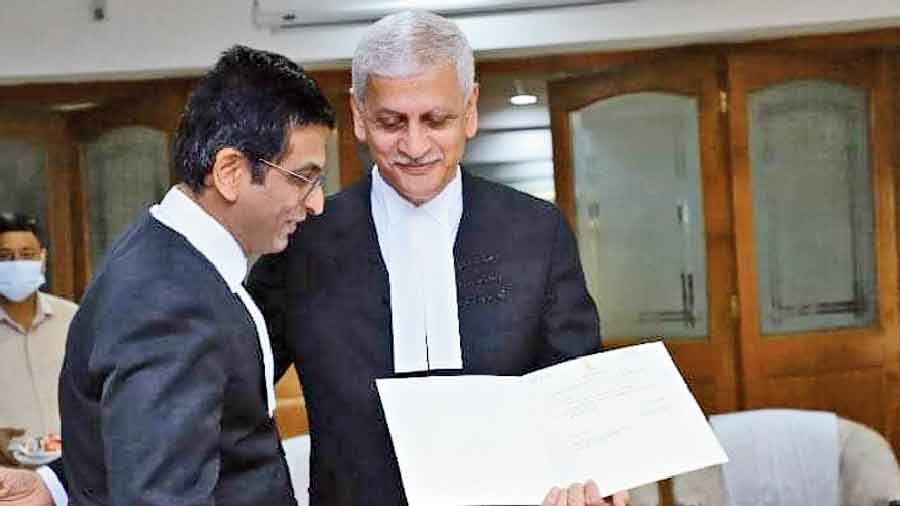The central government’s delay in clearing the elevation of Bombay High Court Chief Justice Dipankar Datta to the Supreme Court and the appointment of Orissa High Court Chief Justice S. Muralidhar as chief justice of Madras High Court has caused uneasiness in the judiciary.
Two years ago, Justice Muralidhar’s transfer from Delhi High Court to Punjab and Haryana High Court had created controversy because it had come a day after a bench headed by him had taken a tough stand on provocative speeches, some of these attributed by a petitioner to BJP leaders.
Although the Supreme Court collegium had recommended the transfer a fortnight earlier, critics had refused to believe that the date of its implementation was a coincidence, particularly since the government often delays such recommendations for months.
Currently, the government has been sitting on the collegium’s latest recommendations on Justice Datta and Justice Muralidhar for nearly a month, the delay reigniting the familiar charge of the Centre adopting a “pick-and-choose” policy on judges.
A perception is also growing in the Bar and among the judiciary that the collegium’s perceived reluctance to assert itself facilitates the government’s practice of withholding appointments or clearing them in instalments, depriving some judges of their seniority.
The collegium, made up of Chief Justice of India U.U. Lalit and the next four senior-most judges of the Supreme Court, recommended Justice Datta for elevation to the Supreme Court through a unanimous resolution on September 27.
If the government clears the recommendation, Justice Datta will have a fairly long tenure in the Supreme Court, retiring in February 2030 as the second senior-most judge.
Justice Datta had been appointed a permanent judge of Calcutta High Court on June 22, 2006, and was later elevated as Bombay High Court chief justice on April 28, 2020.
On September 28, the collegium recommended the appointment of Justice Jaswant Singh, an Orissa High Court judge, as chief justice of the same high court; of Justice P.B. Varale, Bombay High Court judge, as chief justice of Karnataka High Court; of Justice Pankaj Mithal, chief justice of Jammu and Kashmir and Ladakh High Court, as chief justice of Rajasthan High Court; and of Justice Ali Mohammad Magrey, judge of Jammu and Kashmir and Ladakh High Court, as chief justice of the same high court, apart from the recommendation on Justice Muralidhar.
On October 17, the government issued a notification clearing the appointments of Justice Varale, Justice Mithal and Justice Magrey, but not those of Justice Muralidhar or Justice Singh. Justice Singh can anyway not be appointed as chief justice of Orissa High Court until Justice Muralidhar is transferred.
Madras High Court is bigger than Orissa High Court, and Justice Muralidhar’s transfer there will also improve his chances of being recommended for elevation to the Supreme Court.
Justice Muralidhar had on February 26, 2020, as head of a two-judge bench of Delhi High Court, come down heavily on the Centre, which controls Delhi police, for its inaction against those who made inflammatory speeches ahead of the Delhi riots that week.
The bench was dealing with a petition moved by former bureaucrat Harsh Mander who had accused BJP leaders Anurag Thakur, Kapil Mishra and others of delivering inflammatory speeches. Justice Muralidhar gave the Centre a 24-hour ultimatum to come out with its stance on whether it intended to register an FIR against the alleged provocateurs.
But before the judge could pass further directions, the Centre came out with a notification on February 27, 2020, transferring him along with the three other judges.
Many activists saw this as a consequence of Justice Muralidhar’s order the previous day, while then Union law minister Ravi Shankar Prasad cited the February 12, 2020, collegium recommendation for the transfer and accused the Opposition of unnecessarily politicising the matter.
For all its delays in clearing judges’ appointments, the Centre had earlier this year shown that it can approve the collegium’s recommendations in 48 hours if it wants.
On May 7, the government had cleared Justice Sudhanshu Dhulia, then chief justice of Gauhati High Court, and Justice J.B. Pardiwala, then a Gujarat High Court judge, for elevation to the Supreme Court as recommended by the collegium on May 5.
At the time, several previous recommendations made by the collegium were still pending, buttressing the allegations of a pick-and-choose policy.












